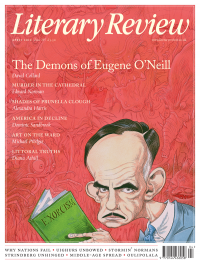Irving Wardle
Mr Julie
Strindberg: A Life
By Sue Prideaux
Yale University Press 371pp £25
He liked to work to the sound of children playing. He could make flowers grow where none had grown before. His pupils remembered him as the kindest and best teacher they ever had. He was a champion of sexual equality and set out to write plays strictly to advance his wife’s acting career. He was preternaturally nervous of public speaking, and generally struck people as shy, prudish, and rational.
These are not characteristics that first spring to mind at the name of August Strindberg, Sweden’s number one misogynist, paranoiac, and all-round nutcase, but they are essential elements of the portrait that emerges from Sue Prideaux’s deeply researched and engrossing biography. They are not the whole story, however. Dote on

Sign Up to our newsletter
Receive free articles, highlights from the archive, news, details of prizes, and much more.@Lit_Review
Follow Literary Review on Twitter
Twitter Feed
Under its longest-serving editor, Graydon Carter, Vanity Fair was that rare thing – a New York society magazine that published serious journalism.
@PeterPeteryork looks at what Carter got right.
Peter York - Deluxe Editions
Peter York: Deluxe Editions - When the Going Was Good: An Editor’s Adventures During the Last Golden Age of Magazines by Graydon Carter
literaryreview.co.uk
Henry James returned to America in 1904 with three objectives: to see his brother William, to deliver a series of lectures on Balzac, and to gather material for a pair of books about modern America.
Peter Rose follows James out west.
Peter Rose - The Restless Analyst
Peter Rose: The Restless Analyst - Henry James Comes Home: Rediscovering America in the Gilded Age by Peter Brooks...
literaryreview.co.uk
Vladimir Putin served his apprenticeship in the KGB toward the end of the Cold War, a period during which Western societies were infiltrated by so-called 'illegals'.
Piers Brendon examines how the culture of Soviet spycraft shaped his thinking.
Piers Brendon - Tinker, Tailor, Sleeper, Troll
Piers Brendon: Tinker, Tailor, Sleeper, Troll - The Illegals: Russia’s Most Audacious Spies and the Plot to Infiltrate the West by Shaun Walker
literaryreview.co.uk